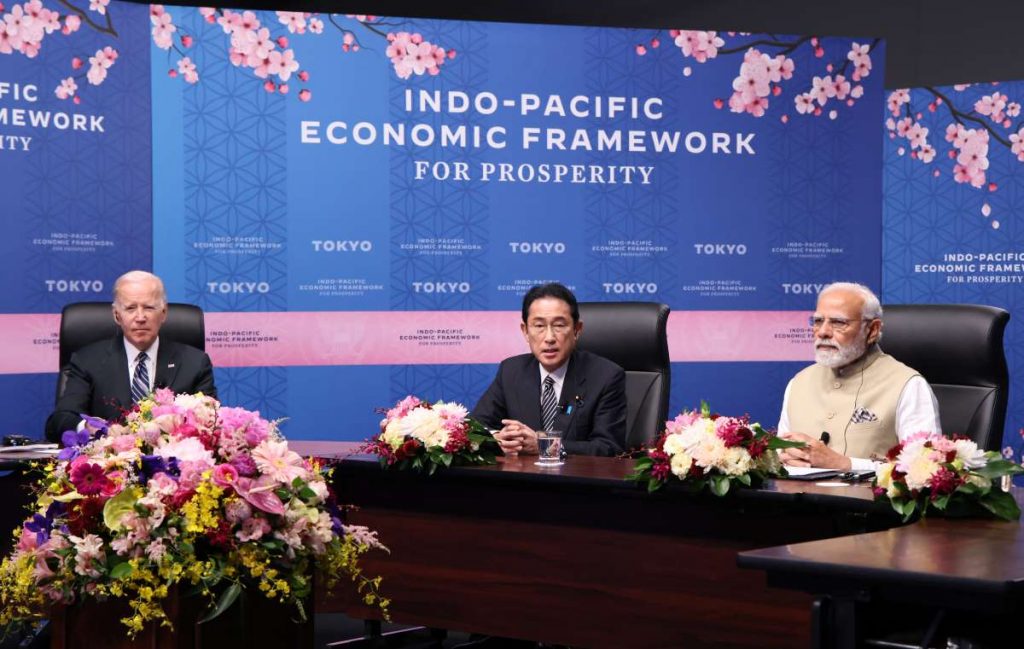When the role of democracies in promoting equal representation is discussed, two critical factors always need to be checked on: inclusion and equality. The democracies of the 21st century should ensure promotion of non-discriminatory, diverse, equitable, accessible, inclusive, and above all, sustainable environments in very aspect.
The ongoing power play among major powers increasingly demonstrates that Indo-Pacific’s security institutions (traditional & non-traditional) will most likely serve as instruments of competitive influence. It is in this backdrop that efforts need to be stepped up towards a framework to promote dialogue and interlinked partnerships among major Indo-Pacific democracies.
Cooperating to Ensure Resilient Democracies
India and Japan have affirmed their commitment to strengthening the resilience of democracies to work towards equitable, inclusive, and sustainable solutions to global challenges, including amongst the most pressing ones: climate change, COVID-19 pandemic, rules-based and sustainable trade, alleviating global inequalities, and raising the standards of living across sections.
Taking note of the 2021 Carbis Bay Open Societies Statement, and in recognition of the dramatic changes in the geopolitical situation globally, New Delhi and Tokyo remain steadfast and, in the forefront, to stepping up international cooperation to improve human security and resilience of democratic societies globally.
This also brings to light the need for further strengthening multilateral institutions to address global challenges, and develop and use technologies in accordance with democratic principles for the benefit of humanity.
The G7 (including Japan) and its five partner countries, including India, have committed at Germany’s G7 Elmau Summit in June 2022 to open public debate and the free flow of information, online and offline, while guarding the freedom, independence and diversity of civil society actors.
Leading on Climate in the Run-Up to COP27
In the realm of non-traditional security challenges, the Indo-Japanese partnership remains a key pillar to fight climate change, prevent environmental degradation and loss of biodiversity, mobilize climate finance and supporting a just, equitable, and socially-inclusive transformation agenda.
This, consequently, would remain beneficial in ensuring an orderly, fair, and equitable energy transition taking into account energy security, national development priorities, viable and affordable technologies, and cooperating closely in the run-up to the 27th Conference of the Parties to the United Nations Climate Change Conference (COP27).
The 2022 Resilient Democracies G7 Summit also spelt out pursuing concerted efforts to overcome the COVID-19 pandemic and improve vaccine distribution and production, as well as the global health architecture for future health crises, with the World Health Organization (WHO) in a central role.
Moreover, perhaps the most significant arena identified during this meeting including India and Japan was the fight against global inequalities and exclusions, which have only deepened further during the pandemic, and pursuit of inclusive policies to secure recovery, as well as intensify efforts to meet the Sustainable Development Goals (SDGs) of the 2030 Agenda.
It presumably shall factor in methods to strengthen the means of implementation and revitalization of the Global Partnership for Sustainable Development, including promotion of equal partnerships through the G20 Compact with Africa, taking note of G7’s efforts for infrastructure investment.
Ensuring Security and Stability in the Region
Both Tokyo and New Delhi are cognizant towards their commitment to bolster cooperation in collectively addressing various traditional and non-traditional security challenges, which will be instrumental in ensuring security and stability for the greater Indo-Pacific region.
For instance, the 2016 Vientiane Declaration, while addressing social and environmental impacts, underscored the “…importance of promoting quality infrastructure development, which ensures factors such as economic efficiency in view of life cycle cost, safety, resilience and sustainability, job creation, capacity building, transfer of expertise and know-how, and alignment with economic and development strategies.”
Further, international conferences entitled Sustainable Development through Quality Infrastructure Investment in January 2016 and February 2017 organized by the World Bank and Japan aimed at promoting common understanding regarding major characteristics of quality infrastructure investment and its relevance to economic growth, and at examining concrete methods to realize quality infrastructure investment effectively.
The core ideal of Japan’s quality infrastructure lies in the promotion of strong, sustainable and balanced growth by enhancing the resilience of the society. This ideal was included in the ‘Principles for Promoting Quality Infrastructure Investment’ adopted during the Japan-hosted G7 Ise-Shima Summit in May 2016.
While recognizing that effective mobilization of resources in quantity is imperative, the G7 highlighted that investment without the quality perspective could end up introducing infrastructure with higher life cycle costs, less durability, inequitable distributive effects, highly negative environmental and social impacts, vulnerability against natural disasters and climate change impacts.
In all, what remains critically vital to every Asian nation is ensuring that democratic nations and voices shall eventually prevail in Asia, and provide an assurance of its growth and sustainable development.
Dr. Monika Chansoria is a Senior Fellow at the Japan Institute of International Affairs (JIIA) in Tokyo. The views expressed here are personal. Find other articles by Dr Chansoria here on JAPAN Forward.
